Contract Law: Detailed Analysis of Mistake, Identity and Nemo Dat Rule
VerifiedAdded on 2020/01/07
|11
|4853
|224
Essay
AI Summary
This essay delves into the intricacies of contract law, specifically addressing the doctrines of mistake and the nemo dat rule. It begins by highlighting the complexities and uncertainties within contract law, particularly concerning errors in contract formation. The essay explores different types of mistakes, including mistakes of law and mistakes of fact, and their impact on contractual parties. It then analyzes key legal principles and their application through case studies such as Shogun Finance v Hudson (2003), Phillips v Brooks Ltd (1919), and King's Norton Metal Co. Ltd. v. Edridge, Merrett &Co. Ltd. These cases illustrate how courts deal with mistaken identity and the transfer of title. The essay explains the nemo dat rule, which states that a person cannot transfer a better title than they possess. The essay further examines the exceptions to this rule and how they protect innocent buyers. It differentiates between face-to-face and arm's-length dealings, emphasizing how these factors influence the validity of contracts in cases of mistaken identity. Overall, the essay provides a comprehensive overview of these critical contract law concepts and their practical application in various legal scenarios, offering valuable insights into the interplay of mistake, identity, and property rights in contractual agreements.
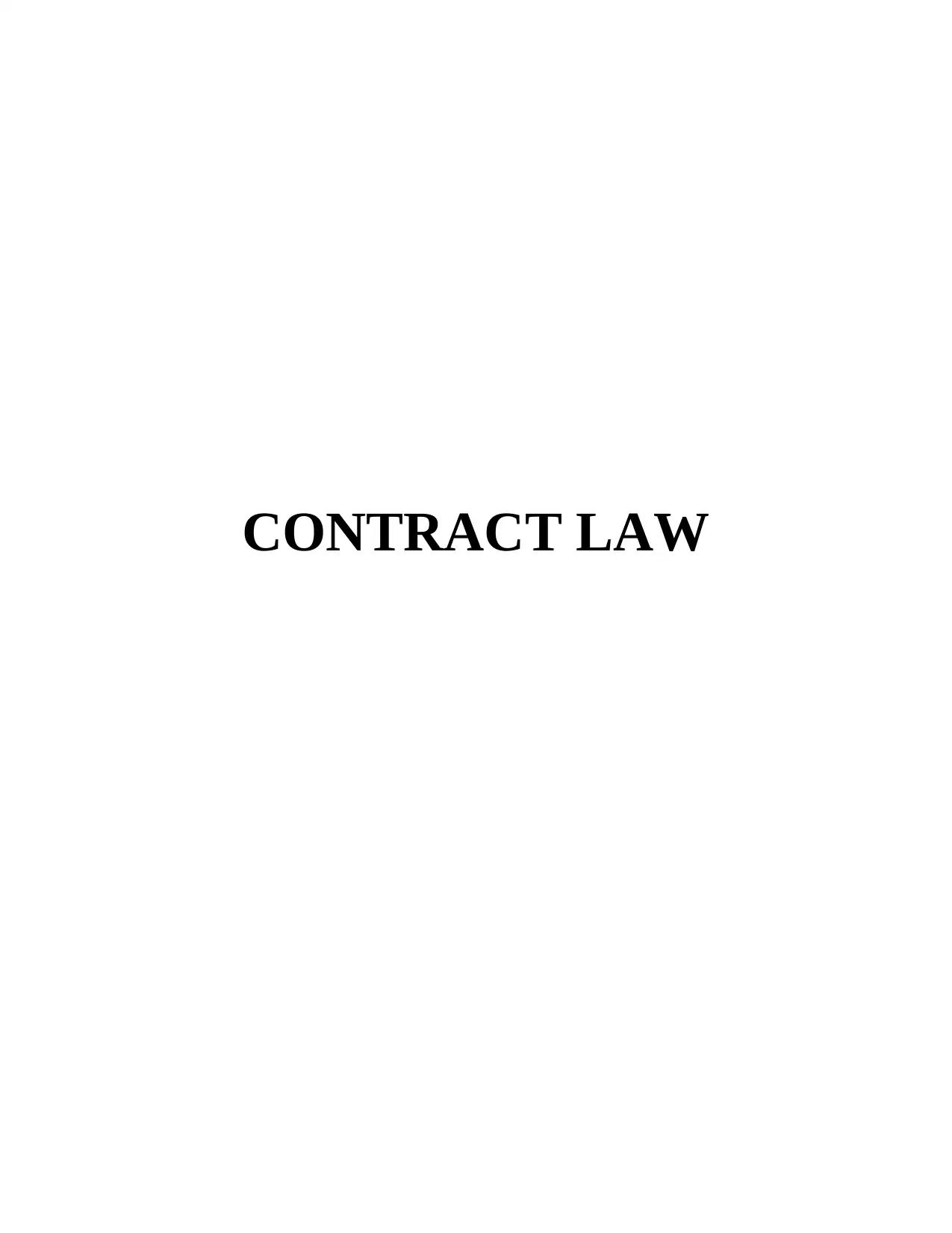
CONTRACT LAW
Paraphrase This Document
Need a fresh take? Get an instant paraphrase of this document with our AI Paraphraser
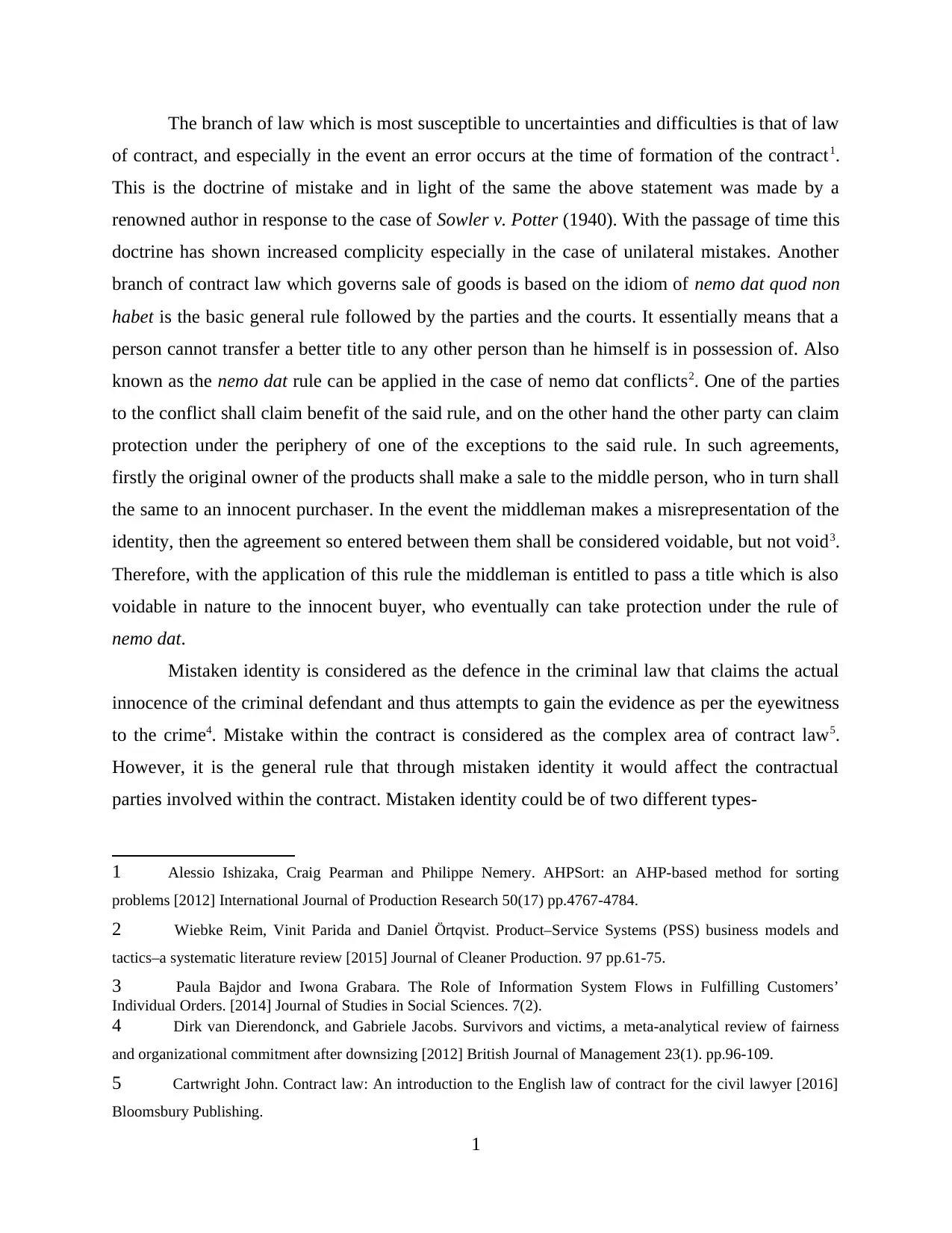
The branch of law which is most susceptible to uncertainties and difficulties is that of law
of contract, and especially in the event an error occurs at the time of formation of the contract1.
This is the doctrine of mistake and in light of the same the above statement was made by a
renowned author in response to the case of Sowler v. Potter (1940). With the passage of time this
doctrine has shown increased complicity especially in the case of unilateral mistakes. Another
branch of contract law which governs sale of goods is based on the idiom of nemo dat quod non
habet is the basic general rule followed by the parties and the courts. It essentially means that a
person cannot transfer a better title to any other person than he himself is in possession of. Also
known as the nemo dat rule can be applied in the case of nemo dat conflicts2. One of the parties
to the conflict shall claim benefit of the said rule, and on the other hand the other party can claim
protection under the periphery of one of the exceptions to the said rule. In such agreements,
firstly the original owner of the products shall make a sale to the middle person, who in turn shall
the same to an innocent purchaser. In the event the middleman makes a misrepresentation of the
identity, then the agreement so entered between them shall be considered voidable, but not void3.
Therefore, with the application of this rule the middleman is entitled to pass a title which is also
voidable in nature to the innocent buyer, who eventually can take protection under the rule of
nemo dat.
Mistaken identity is considered as the defence in the criminal law that claims the actual
innocence of the criminal defendant and thus attempts to gain the evidence as per the eyewitness
to the crime4. Mistake within the contract is considered as the complex area of contract law5.
However, it is the general rule that through mistaken identity it would affect the contractual
parties involved within the contract. Mistaken identity could be of two different types-
1 Alessio Ishizaka, Craig Pearman and Philippe Nemery. AHPSort: an AHP-based method for sorting
problems [2012] International Journal of Production Research 50(17) pp.4767-4784.
2 Wiebke Reim, Vinit Parida and Daniel Örtqvist. Product–Service Systems (PSS) business models and
tactics–a systematic literature review [2015] Journal of Cleaner Production. 97 pp.61-75.
3 Paula Bajdor and Iwona Grabara. The Role of Information System Flows in Fulfilling Customers’
Individual Orders. [2014] Journal of Studies in Social Sciences. 7(2).
4 Dirk van Dierendonck, and Gabriele Jacobs. Survivors and victims, a meta‐analytical review of fairness
and organizational commitment after downsizing [2012] British Journal of Management 23(1). pp.96-109.
5 Cartwright John. Contract law: An introduction to the English law of contract for the civil lawyer [2016]
Bloomsbury Publishing.
1
of contract, and especially in the event an error occurs at the time of formation of the contract1.
This is the doctrine of mistake and in light of the same the above statement was made by a
renowned author in response to the case of Sowler v. Potter (1940). With the passage of time this
doctrine has shown increased complicity especially in the case of unilateral mistakes. Another
branch of contract law which governs sale of goods is based on the idiom of nemo dat quod non
habet is the basic general rule followed by the parties and the courts. It essentially means that a
person cannot transfer a better title to any other person than he himself is in possession of. Also
known as the nemo dat rule can be applied in the case of nemo dat conflicts2. One of the parties
to the conflict shall claim benefit of the said rule, and on the other hand the other party can claim
protection under the periphery of one of the exceptions to the said rule. In such agreements,
firstly the original owner of the products shall make a sale to the middle person, who in turn shall
the same to an innocent purchaser. In the event the middleman makes a misrepresentation of the
identity, then the agreement so entered between them shall be considered voidable, but not void3.
Therefore, with the application of this rule the middleman is entitled to pass a title which is also
voidable in nature to the innocent buyer, who eventually can take protection under the rule of
nemo dat.
Mistaken identity is considered as the defence in the criminal law that claims the actual
innocence of the criminal defendant and thus attempts to gain the evidence as per the eyewitness
to the crime4. Mistake within the contract is considered as the complex area of contract law5.
However, it is the general rule that through mistaken identity it would affect the contractual
parties involved within the contract. Mistaken identity could be of two different types-
1 Alessio Ishizaka, Craig Pearman and Philippe Nemery. AHPSort: an AHP-based method for sorting
problems [2012] International Journal of Production Research 50(17) pp.4767-4784.
2 Wiebke Reim, Vinit Parida and Daniel Örtqvist. Product–Service Systems (PSS) business models and
tactics–a systematic literature review [2015] Journal of Cleaner Production. 97 pp.61-75.
3 Paula Bajdor and Iwona Grabara. The Role of Information System Flows in Fulfilling Customers’
Individual Orders. [2014] Journal of Studies in Social Sciences. 7(2).
4 Dirk van Dierendonck, and Gabriele Jacobs. Survivors and victims, a meta‐analytical review of fairness
and organizational commitment after downsizing [2012] British Journal of Management 23(1). pp.96-109.
5 Cartwright John. Contract law: An introduction to the English law of contract for the civil lawyer [2016]
Bloomsbury Publishing.
1
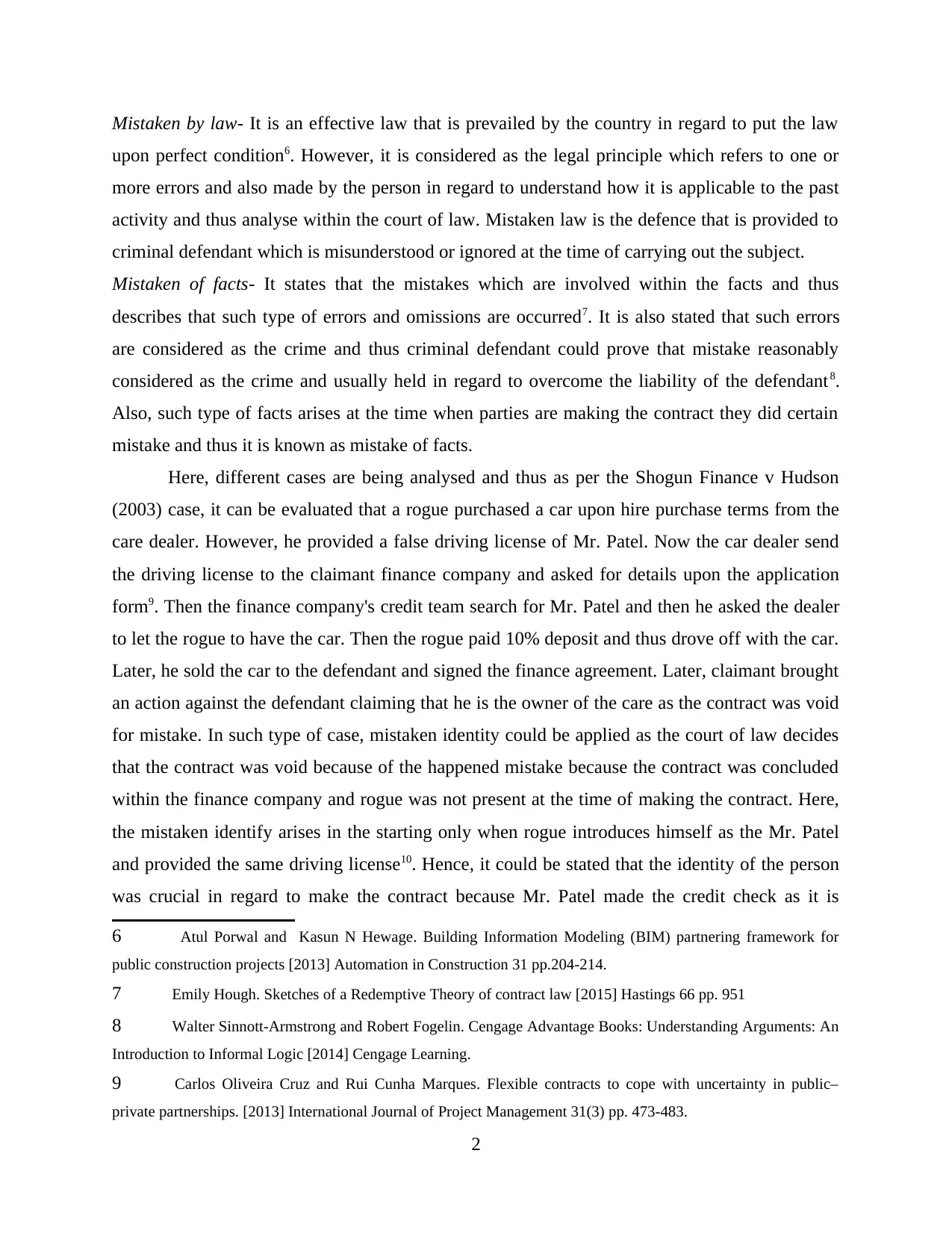
Mistaken by law- It is an effective law that is prevailed by the country in regard to put the law
upon perfect condition6. However, it is considered as the legal principle which refers to one or
more errors and also made by the person in regard to understand how it is applicable to the past
activity and thus analyse within the court of law. Mistaken law is the defence that is provided to
criminal defendant which is misunderstood or ignored at the time of carrying out the subject.
Mistaken of facts- It states that the mistakes which are involved within the facts and thus
describes that such type of errors and omissions are occurred7. It is also stated that such errors
are considered as the crime and thus criminal defendant could prove that mistake reasonably
considered as the crime and usually held in regard to overcome the liability of the defendant8.
Also, such type of facts arises at the time when parties are making the contract they did certain
mistake and thus it is known as mistake of facts.
Here, different cases are being analysed and thus as per the Shogun Finance v Hudson
(2003) case, it can be evaluated that a rogue purchased a car upon hire purchase terms from the
care dealer. However, he provided a false driving license of Mr. Patel. Now the car dealer send
the driving license to the claimant finance company and asked for details upon the application
form9. Then the finance company's credit team search for Mr. Patel and then he asked the dealer
to let the rogue to have the car. Then the rogue paid 10% deposit and thus drove off with the car.
Later, he sold the car to the defendant and signed the finance agreement. Later, claimant brought
an action against the defendant claiming that he is the owner of the care as the contract was void
for mistake. In such type of case, mistaken identity could be applied as the court of law decides
that the contract was void because of the happened mistake because the contract was concluded
within the finance company and rogue was not present at the time of making the contract. Here,
the mistaken identify arises in the starting only when rogue introduces himself as the Mr. Patel
and provided the same driving license10. Hence, it could be stated that the identity of the person
was crucial in regard to make the contract because Mr. Patel made the credit check as it is
6 Atul Porwal and Kasun N Hewage. Building Information Modeling (BIM) partnering framework for
public construction projects [2013] Automation in Construction 31 pp.204-214.
7 Emily Hough. Sketches of a Redemptive Theory of contract law [2015] Hastings 66 pp. 951
8 Walter Sinnott-Armstrong and Robert Fogelin. Cengage Advantage Books: Understanding Arguments: An
Introduction to Informal Logic [2014] Cengage Learning.
9 Carlos Oliveira Cruz and Rui Cunha Marques. Flexible contracts to cope with uncertainty in public–
private partnerships. [2013] International Journal of Project Management 31(3) pp. 473-483.
2
upon perfect condition6. However, it is considered as the legal principle which refers to one or
more errors and also made by the person in regard to understand how it is applicable to the past
activity and thus analyse within the court of law. Mistaken law is the defence that is provided to
criminal defendant which is misunderstood or ignored at the time of carrying out the subject.
Mistaken of facts- It states that the mistakes which are involved within the facts and thus
describes that such type of errors and omissions are occurred7. It is also stated that such errors
are considered as the crime and thus criminal defendant could prove that mistake reasonably
considered as the crime and usually held in regard to overcome the liability of the defendant8.
Also, such type of facts arises at the time when parties are making the contract they did certain
mistake and thus it is known as mistake of facts.
Here, different cases are being analysed and thus as per the Shogun Finance v Hudson
(2003) case, it can be evaluated that a rogue purchased a car upon hire purchase terms from the
care dealer. However, he provided a false driving license of Mr. Patel. Now the car dealer send
the driving license to the claimant finance company and asked for details upon the application
form9. Then the finance company's credit team search for Mr. Patel and then he asked the dealer
to let the rogue to have the car. Then the rogue paid 10% deposit and thus drove off with the car.
Later, he sold the car to the defendant and signed the finance agreement. Later, claimant brought
an action against the defendant claiming that he is the owner of the care as the contract was void
for mistake. In such type of case, mistaken identity could be applied as the court of law decides
that the contract was void because of the happened mistake because the contract was concluded
within the finance company and rogue was not present at the time of making the contract. Here,
the mistaken identify arises in the starting only when rogue introduces himself as the Mr. Patel
and provided the same driving license10. Hence, it could be stated that the identity of the person
was crucial in regard to make the contract because Mr. Patel made the credit check as it is
6 Atul Porwal and Kasun N Hewage. Building Information Modeling (BIM) partnering framework for
public construction projects [2013] Automation in Construction 31 pp.204-214.
7 Emily Hough. Sketches of a Redemptive Theory of contract law [2015] Hastings 66 pp. 951
8 Walter Sinnott-Armstrong and Robert Fogelin. Cengage Advantage Books: Understanding Arguments: An
Introduction to Informal Logic [2014] Cengage Learning.
9 Carlos Oliveira Cruz and Rui Cunha Marques. Flexible contracts to cope with uncertainty in public–
private partnerships. [2013] International Journal of Project Management 31(3) pp. 473-483.
2
⊘ This is a preview!⊘
Do you want full access?
Subscribe today to unlock all pages.

Trusted by 1+ million students worldwide
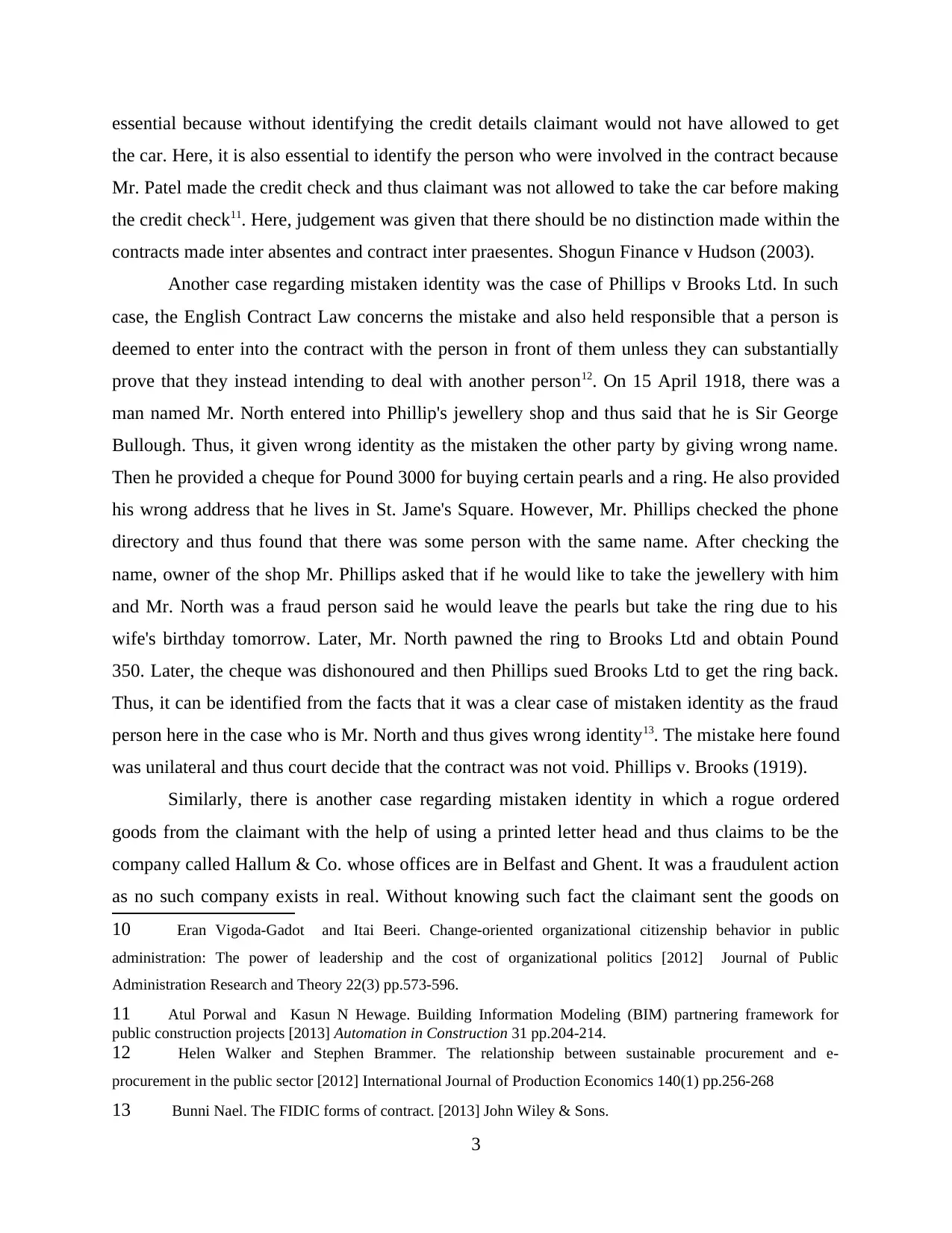
essential because without identifying the credit details claimant would not have allowed to get
the car. Here, it is also essential to identify the person who were involved in the contract because
Mr. Patel made the credit check and thus claimant was not allowed to take the car before making
the credit check11. Here, judgement was given that there should be no distinction made within the
contracts made inter absentes and contract inter praesentes. Shogun Finance v Hudson (2003).
Another case regarding mistaken identity was the case of Phillips v Brooks Ltd. In such
case, the English Contract Law concerns the mistake and also held responsible that a person is
deemed to enter into the contract with the person in front of them unless they can substantially
prove that they instead intending to deal with another person12. On 15 April 1918, there was a
man named Mr. North entered into Phillip's jewellery shop and thus said that he is Sir George
Bullough. Thus, it given wrong identity as the mistaken the other party by giving wrong name.
Then he provided a cheque for Pound 3000 for buying certain pearls and a ring. He also provided
his wrong address that he lives in St. Jame's Square. However, Mr. Phillips checked the phone
directory and thus found that there was some person with the same name. After checking the
name, owner of the shop Mr. Phillips asked that if he would like to take the jewellery with him
and Mr. North was a fraud person said he would leave the pearls but take the ring due to his
wife's birthday tomorrow. Later, Mr. North pawned the ring to Brooks Ltd and obtain Pound
350. Later, the cheque was dishonoured and then Phillips sued Brooks Ltd to get the ring back.
Thus, it can be identified from the facts that it was a clear case of mistaken identity as the fraud
person here in the case who is Mr. North and thus gives wrong identity13. The mistake here found
was unilateral and thus court decide that the contract was not void. Phillips v. Brooks (1919).
Similarly, there is another case regarding mistaken identity in which a rogue ordered
goods from the claimant with the help of using a printed letter head and thus claims to be the
company called Hallum & Co. whose offices are in Belfast and Ghent. It was a fraudulent action
as no such company exists in real. Without knowing such fact the claimant sent the goods on
10 Eran Vigoda-Gadot and Itai Beeri. Change-oriented organizational citizenship behavior in public
administration: The power of leadership and the cost of organizational politics [2012] Journal of Public
Administration Research and Theory 22(3) pp.573-596.
11 Atul Porwal and Kasun N Hewage. Building Information Modeling (BIM) partnering framework for
public construction projects [2013] Automation in Construction 31 pp.204-214.
12 Helen Walker and Stephen Brammer. The relationship between sustainable procurement and e-
procurement in the public sector [2012] International Journal of Production Economics 140(1) pp.256-268
13 Bunni Nael. The FIDIC forms of contract. [2013] John Wiley & Sons.
3
the car. Here, it is also essential to identify the person who were involved in the contract because
Mr. Patel made the credit check and thus claimant was not allowed to take the car before making
the credit check11. Here, judgement was given that there should be no distinction made within the
contracts made inter absentes and contract inter praesentes. Shogun Finance v Hudson (2003).
Another case regarding mistaken identity was the case of Phillips v Brooks Ltd. In such
case, the English Contract Law concerns the mistake and also held responsible that a person is
deemed to enter into the contract with the person in front of them unless they can substantially
prove that they instead intending to deal with another person12. On 15 April 1918, there was a
man named Mr. North entered into Phillip's jewellery shop and thus said that he is Sir George
Bullough. Thus, it given wrong identity as the mistaken the other party by giving wrong name.
Then he provided a cheque for Pound 3000 for buying certain pearls and a ring. He also provided
his wrong address that he lives in St. Jame's Square. However, Mr. Phillips checked the phone
directory and thus found that there was some person with the same name. After checking the
name, owner of the shop Mr. Phillips asked that if he would like to take the jewellery with him
and Mr. North was a fraud person said he would leave the pearls but take the ring due to his
wife's birthday tomorrow. Later, Mr. North pawned the ring to Brooks Ltd and obtain Pound
350. Later, the cheque was dishonoured and then Phillips sued Brooks Ltd to get the ring back.
Thus, it can be identified from the facts that it was a clear case of mistaken identity as the fraud
person here in the case who is Mr. North and thus gives wrong identity13. The mistake here found
was unilateral and thus court decide that the contract was not void. Phillips v. Brooks (1919).
Similarly, there is another case regarding mistaken identity in which a rogue ordered
goods from the claimant with the help of using a printed letter head and thus claims to be the
company called Hallum & Co. whose offices are in Belfast and Ghent. It was a fraudulent action
as no such company exists in real. Without knowing such fact the claimant sent the goods on
10 Eran Vigoda-Gadot and Itai Beeri. Change-oriented organizational citizenship behavior in public
administration: The power of leadership and the cost of organizational politics [2012] Journal of Public
Administration Research and Theory 22(3) pp.573-596.
11 Atul Porwal and Kasun N Hewage. Building Information Modeling (BIM) partnering framework for
public construction projects [2013] Automation in Construction 31 pp.204-214.
12 Helen Walker and Stephen Brammer. The relationship between sustainable procurement and e-
procurement in the public sector [2012] International Journal of Production Economics 140(1) pp.256-268
13 Bunni Nael. The FIDIC forms of contract. [2013] John Wiley & Sons.
3
Paraphrase This Document
Need a fresh take? Get an instant paraphrase of this document with our AI Paraphraser
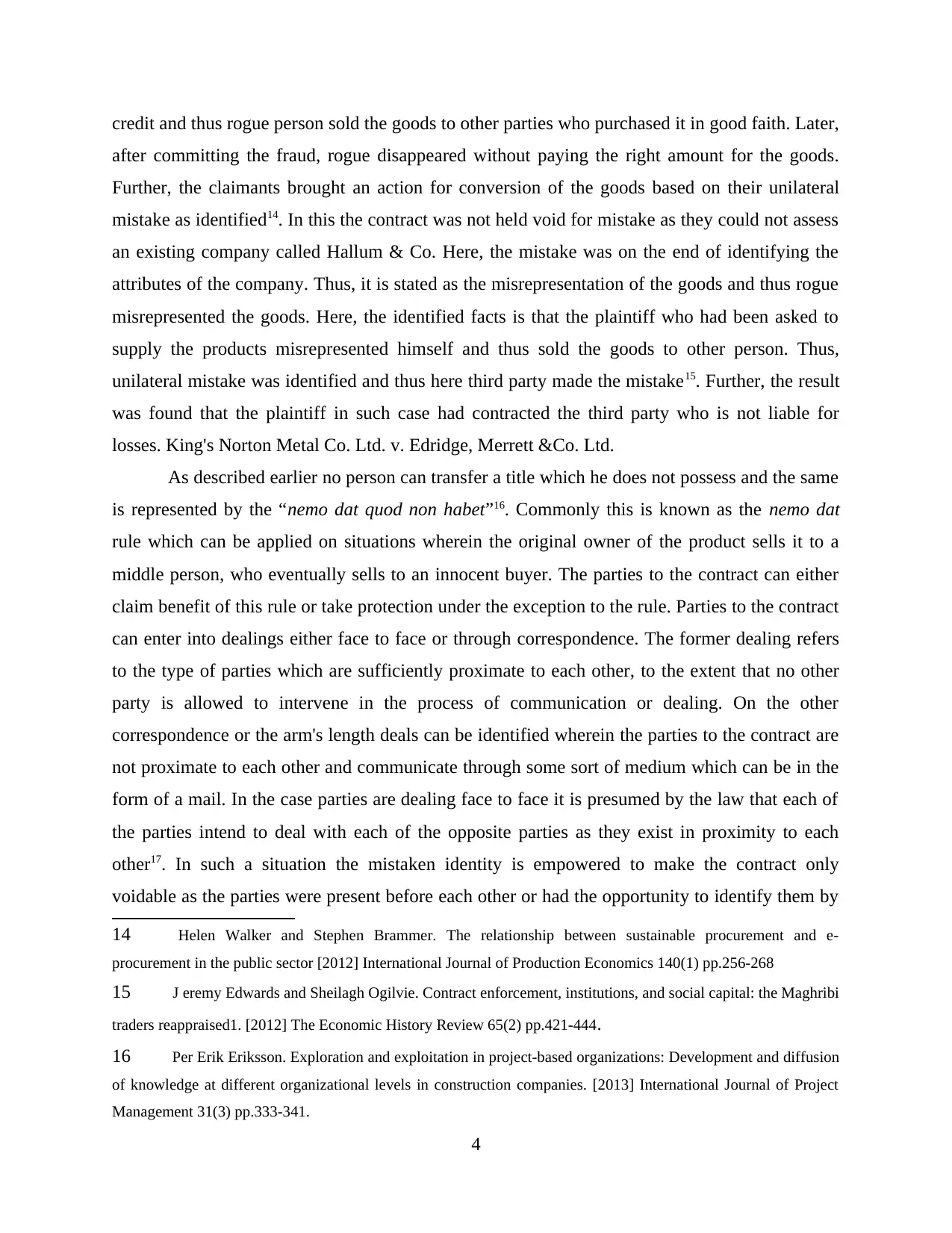
credit and thus rogue person sold the goods to other parties who purchased it in good faith. Later,
after committing the fraud, rogue disappeared without paying the right amount for the goods.
Further, the claimants brought an action for conversion of the goods based on their unilateral
mistake as identified14. In this the contract was not held void for mistake as they could not assess
an existing company called Hallum & Co. Here, the mistake was on the end of identifying the
attributes of the company. Thus, it is stated as the misrepresentation of the goods and thus rogue
misrepresented the goods. Here, the identified facts is that the plaintiff who had been asked to
supply the products misrepresented himself and thus sold the goods to other person. Thus,
unilateral mistake was identified and thus here third party made the mistake15. Further, the result
was found that the plaintiff in such case had contracted the third party who is not liable for
losses. King's Norton Metal Co. Ltd. v. Edridge, Merrett &Co. Ltd.
As described earlier no person can transfer a title which he does not possess and the same
is represented by the “nemo dat quod non habet”16. Commonly this is known as the nemo dat
rule which can be applied on situations wherein the original owner of the product sells it to a
middle person, who eventually sells to an innocent buyer. The parties to the contract can either
claim benefit of this rule or take protection under the exception to the rule. Parties to the contract
can enter into dealings either face to face or through correspondence. The former dealing refers
to the type of parties which are sufficiently proximate to each other, to the extent that no other
party is allowed to intervene in the process of communication or dealing. On the other
correspondence or the arm's length deals can be identified wherein the parties to the contract are
not proximate to each other and communicate through some sort of medium which can be in the
form of a mail. In the case parties are dealing face to face it is presumed by the law that each of
the parties intend to deal with each of the opposite parties as they exist in proximity to each
other17. In such a situation the mistaken identity is empowered to make the contract only
voidable as the parties were present before each other or had the opportunity to identify them by
14 Helen Walker and Stephen Brammer. The relationship between sustainable procurement and e-
procurement in the public sector [2012] International Journal of Production Economics 140(1) pp.256-268
15 J eremy Edwards and Sheilagh Ogilvie. Contract enforcement, institutions, and social capital: the Maghribi
traders reappraised1. [2012] The Economic History Review 65(2) pp.421-444.
16 Per Erik Eriksson. Exploration and exploitation in project-based organizations: Development and diffusion
of knowledge at different organizational levels in construction companies. [2013] International Journal of Project
Management 31(3) pp.333-341.
4
after committing the fraud, rogue disappeared without paying the right amount for the goods.
Further, the claimants brought an action for conversion of the goods based on their unilateral
mistake as identified14. In this the contract was not held void for mistake as they could not assess
an existing company called Hallum & Co. Here, the mistake was on the end of identifying the
attributes of the company. Thus, it is stated as the misrepresentation of the goods and thus rogue
misrepresented the goods. Here, the identified facts is that the plaintiff who had been asked to
supply the products misrepresented himself and thus sold the goods to other person. Thus,
unilateral mistake was identified and thus here third party made the mistake15. Further, the result
was found that the plaintiff in such case had contracted the third party who is not liable for
losses. King's Norton Metal Co. Ltd. v. Edridge, Merrett &Co. Ltd.
As described earlier no person can transfer a title which he does not possess and the same
is represented by the “nemo dat quod non habet”16. Commonly this is known as the nemo dat
rule which can be applied on situations wherein the original owner of the product sells it to a
middle person, who eventually sells to an innocent buyer. The parties to the contract can either
claim benefit of this rule or take protection under the exception to the rule. Parties to the contract
can enter into dealings either face to face or through correspondence. The former dealing refers
to the type of parties which are sufficiently proximate to each other, to the extent that no other
party is allowed to intervene in the process of communication or dealing. On the other
correspondence or the arm's length deals can be identified wherein the parties to the contract are
not proximate to each other and communicate through some sort of medium which can be in the
form of a mail. In the case parties are dealing face to face it is presumed by the law that each of
the parties intend to deal with each of the opposite parties as they exist in proximity to each
other17. In such a situation the mistaken identity is empowered to make the contract only
voidable as the parties were present before each other or had the opportunity to identify them by
14 Helen Walker and Stephen Brammer. The relationship between sustainable procurement and e-
procurement in the public sector [2012] International Journal of Production Economics 140(1) pp.256-268
15 J eremy Edwards and Sheilagh Ogilvie. Contract enforcement, institutions, and social capital: the Maghribi
traders reappraised1. [2012] The Economic History Review 65(2) pp.421-444.
16 Per Erik Eriksson. Exploration and exploitation in project-based organizations: Development and diffusion
of knowledge at different organizational levels in construction companies. [2013] International Journal of Project
Management 31(3) pp.333-341.
4
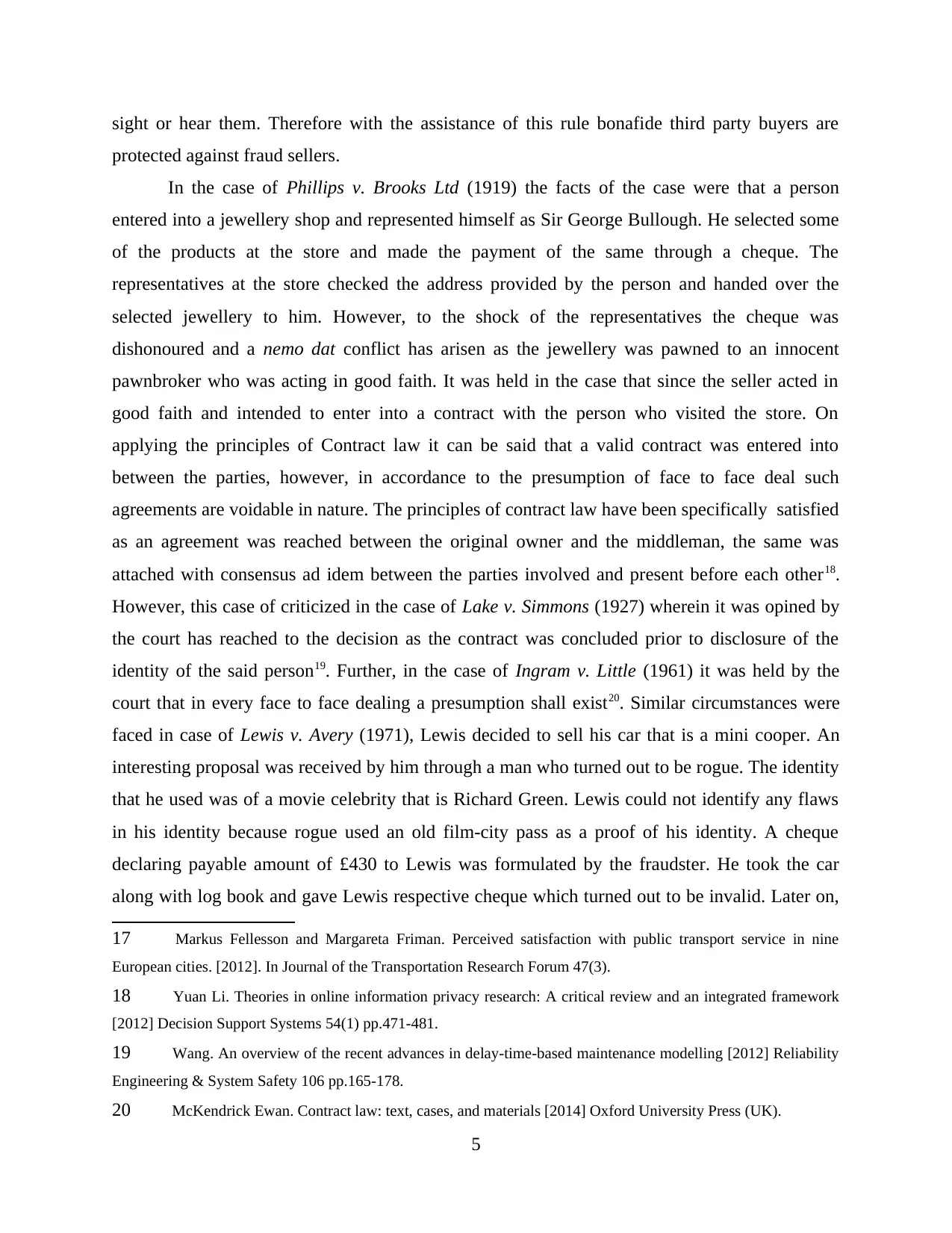
sight or hear them. Therefore with the assistance of this rule bonafide third party buyers are
protected against fraud sellers.
In the case of Phillips v. Brooks Ltd (1919) the facts of the case were that a person
entered into a jewellery shop and represented himself as Sir George Bullough. He selected some
of the products at the store and made the payment of the same through a cheque. The
representatives at the store checked the address provided by the person and handed over the
selected jewellery to him. However, to the shock of the representatives the cheque was
dishonoured and a nemo dat conflict has arisen as the jewellery was pawned to an innocent
pawnbroker who was acting in good faith. It was held in the case that since the seller acted in
good faith and intended to enter into a contract with the person who visited the store. On
applying the principles of Contract law it can be said that a valid contract was entered into
between the parties, however, in accordance to the presumption of face to face deal such
agreements are voidable in nature. The principles of contract law have been specifically satisfied
as an agreement was reached between the original owner and the middleman, the same was
attached with consensus ad idem between the parties involved and present before each other18.
However, this case of criticized in the case of Lake v. Simmons (1927) wherein it was opined by
the court has reached to the decision as the contract was concluded prior to disclosure of the
identity of the said person19. Further, in the case of Ingram v. Little (1961) it was held by the
court that in every face to face dealing a presumption shall exist20. Similar circumstances were
faced in case of Lewis v. Avery (1971), Lewis decided to sell his car that is a mini cooper. An
interesting proposal was received by him through a man who turned out to be rogue. The identity
that he used was of a movie celebrity that is Richard Green. Lewis could not identify any flaws
in his identity because rogue used an old film-city pass as a proof of his identity. A cheque
declaring payable amount of £430 to Lewis was formulated by the fraudster. He took the car
along with log book and gave Lewis respective cheque which turned out to be invalid. Later on,
17 Markus Fellesson and Margareta Friman. Perceived satisfaction with public transport service in nine
European cities. [2012]. In Journal of the Transportation Research Forum 47(3).
18 Yuan Li. Theories in online information privacy research: A critical review and an integrated framework
[2012] Decision Support Systems 54(1) pp.471-481.
19 Wang. An overview of the recent advances in delay-time-based maintenance modelling [2012] Reliability
Engineering & System Safety 106 pp.165-178.
20 McKendrick Ewan. Contract law: text, cases, and materials [2014] Oxford University Press (UK).
5
protected against fraud sellers.
In the case of Phillips v. Brooks Ltd (1919) the facts of the case were that a person
entered into a jewellery shop and represented himself as Sir George Bullough. He selected some
of the products at the store and made the payment of the same through a cheque. The
representatives at the store checked the address provided by the person and handed over the
selected jewellery to him. However, to the shock of the representatives the cheque was
dishonoured and a nemo dat conflict has arisen as the jewellery was pawned to an innocent
pawnbroker who was acting in good faith. It was held in the case that since the seller acted in
good faith and intended to enter into a contract with the person who visited the store. On
applying the principles of Contract law it can be said that a valid contract was entered into
between the parties, however, in accordance to the presumption of face to face deal such
agreements are voidable in nature. The principles of contract law have been specifically satisfied
as an agreement was reached between the original owner and the middleman, the same was
attached with consensus ad idem between the parties involved and present before each other18.
However, this case of criticized in the case of Lake v. Simmons (1927) wherein it was opined by
the court has reached to the decision as the contract was concluded prior to disclosure of the
identity of the said person19. Further, in the case of Ingram v. Little (1961) it was held by the
court that in every face to face dealing a presumption shall exist20. Similar circumstances were
faced in case of Lewis v. Avery (1971), Lewis decided to sell his car that is a mini cooper. An
interesting proposal was received by him through a man who turned out to be rogue. The identity
that he used was of a movie celebrity that is Richard Green. Lewis could not identify any flaws
in his identity because rogue used an old film-city pass as a proof of his identity. A cheque
declaring payable amount of £430 to Lewis was formulated by the fraudster. He took the car
along with log book and gave Lewis respective cheque which turned out to be invalid. Later on,
17 Markus Fellesson and Margareta Friman. Perceived satisfaction with public transport service in nine
European cities. [2012]. In Journal of the Transportation Research Forum 47(3).
18 Yuan Li. Theories in online information privacy research: A critical review and an integrated framework
[2012] Decision Support Systems 54(1) pp.471-481.
19 Wang. An overview of the recent advances in delay-time-based maintenance modelling [2012] Reliability
Engineering & System Safety 106 pp.165-178.
20 McKendrick Ewan. Contract law: text, cases, and materials [2014] Oxford University Press (UK).
5
⊘ This is a preview!⊘
Do you want full access?
Subscribe today to unlock all pages.

Trusted by 1+ million students worldwide
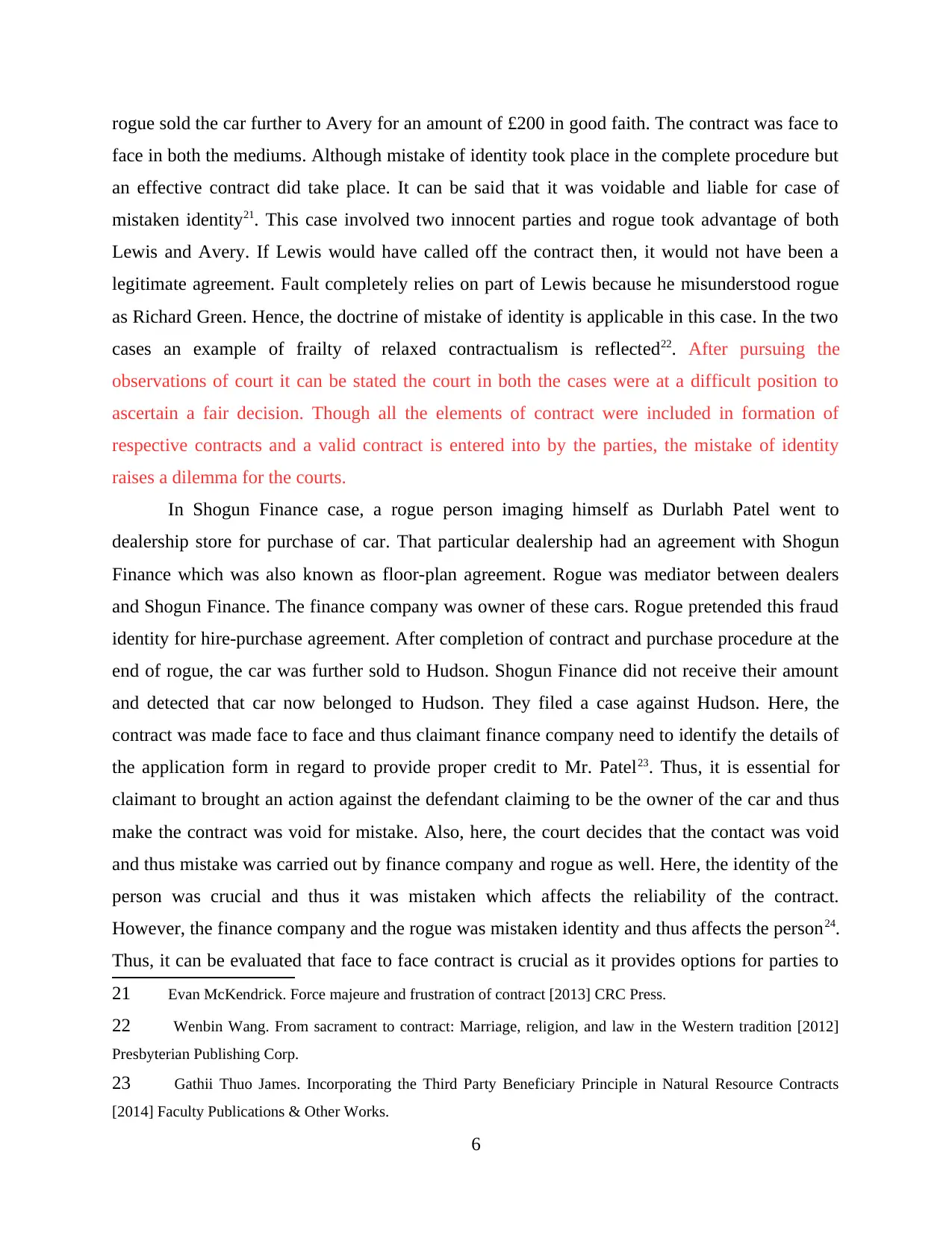
rogue sold the car further to Avery for an amount of £200 in good faith. The contract was face to
face in both the mediums. Although mistake of identity took place in the complete procedure but
an effective contract did take place. It can be said that it was voidable and liable for case of
mistaken identity21. This case involved two innocent parties and rogue took advantage of both
Lewis and Avery. If Lewis would have called off the contract then, it would not have been a
legitimate agreement. Fault completely relies on part of Lewis because he misunderstood rogue
as Richard Green. Hence, the doctrine of mistake of identity is applicable in this case. In the two
cases an example of frailty of relaxed contractualism is reflected22. After pursuing the
observations of court it can be stated the court in both the cases were at a difficult position to
ascertain a fair decision. Though all the elements of contract were included in formation of
respective contracts and a valid contract is entered into by the parties, the mistake of identity
raises a dilemma for the courts.
In Shogun Finance case, a rogue person imaging himself as Durlabh Patel went to
dealership store for purchase of car. That particular dealership had an agreement with Shogun
Finance which was also known as floor-plan agreement. Rogue was mediator between dealers
and Shogun Finance. The finance company was owner of these cars. Rogue pretended this fraud
identity for hire-purchase agreement. After completion of contract and purchase procedure at the
end of rogue, the car was further sold to Hudson. Shogun Finance did not receive their amount
and detected that car now belonged to Hudson. They filed a case against Hudson. Here, the
contract was made face to face and thus claimant finance company need to identify the details of
the application form in regard to provide proper credit to Mr. Patel23. Thus, it is essential for
claimant to brought an action against the defendant claiming to be the owner of the car and thus
make the contract was void for mistake. Also, here, the court decides that the contact was void
and thus mistake was carried out by finance company and rogue as well. Here, the identity of the
person was crucial and thus it was mistaken which affects the reliability of the contract.
However, the finance company and the rogue was mistaken identity and thus affects the person24.
Thus, it can be evaluated that face to face contract is crucial as it provides options for parties to
21 Evan McKendrick. Force majeure and frustration of contract [2013] CRC Press.
22 Wenbin Wang. From sacrament to contract: Marriage, religion, and law in the Western tradition [2012]
Presbyterian Publishing Corp.
23 Gathii Thuo James. Incorporating the Third Party Beneficiary Principle in Natural Resource Contracts
[2014] Faculty Publications & Other Works.
6
face in both the mediums. Although mistake of identity took place in the complete procedure but
an effective contract did take place. It can be said that it was voidable and liable for case of
mistaken identity21. This case involved two innocent parties and rogue took advantage of both
Lewis and Avery. If Lewis would have called off the contract then, it would not have been a
legitimate agreement. Fault completely relies on part of Lewis because he misunderstood rogue
as Richard Green. Hence, the doctrine of mistake of identity is applicable in this case. In the two
cases an example of frailty of relaxed contractualism is reflected22. After pursuing the
observations of court it can be stated the court in both the cases were at a difficult position to
ascertain a fair decision. Though all the elements of contract were included in formation of
respective contracts and a valid contract is entered into by the parties, the mistake of identity
raises a dilemma for the courts.
In Shogun Finance case, a rogue person imaging himself as Durlabh Patel went to
dealership store for purchase of car. That particular dealership had an agreement with Shogun
Finance which was also known as floor-plan agreement. Rogue was mediator between dealers
and Shogun Finance. The finance company was owner of these cars. Rogue pretended this fraud
identity for hire-purchase agreement. After completion of contract and purchase procedure at the
end of rogue, the car was further sold to Hudson. Shogun Finance did not receive their amount
and detected that car now belonged to Hudson. They filed a case against Hudson. Here, the
contract was made face to face and thus claimant finance company need to identify the details of
the application form in regard to provide proper credit to Mr. Patel23. Thus, it is essential for
claimant to brought an action against the defendant claiming to be the owner of the car and thus
make the contract was void for mistake. Also, here, the court decides that the contact was void
and thus mistake was carried out by finance company and rogue as well. Here, the identity of the
person was crucial and thus it was mistaken which affects the reliability of the contract.
However, the finance company and the rogue was mistaken identity and thus affects the person24.
Thus, it can be evaluated that face to face contract is crucial as it provides options for parties to
21 Evan McKendrick. Force majeure and frustration of contract [2013] CRC Press.
22 Wenbin Wang. From sacrament to contract: Marriage, religion, and law in the Western tradition [2012]
Presbyterian Publishing Corp.
23 Gathii Thuo James. Incorporating the Third Party Beneficiary Principle in Natural Resource Contracts
[2014] Faculty Publications & Other Works.
6
Paraphrase This Document
Need a fresh take? Get an instant paraphrase of this document with our AI Paraphraser
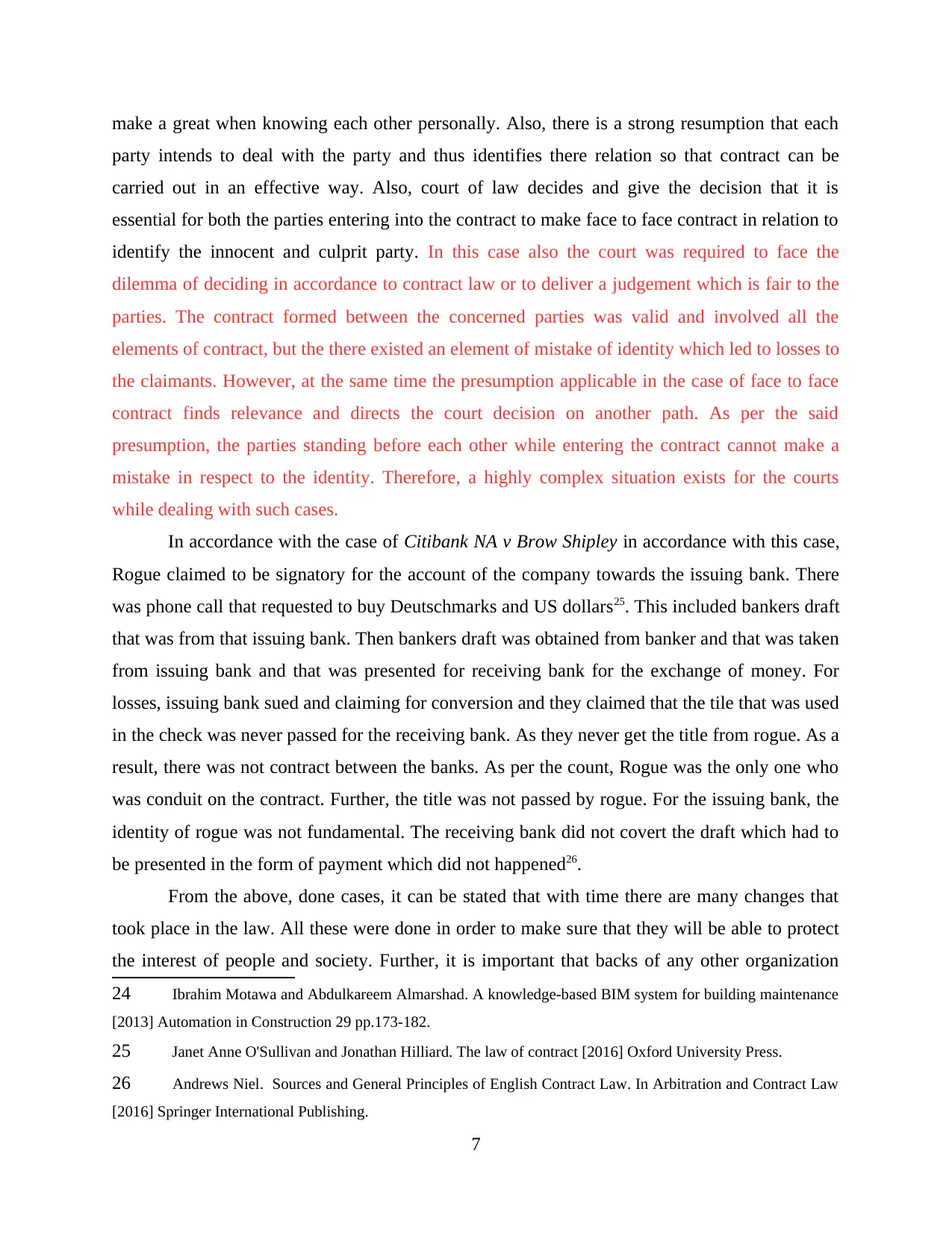
make a great when knowing each other personally. Also, there is a strong resumption that each
party intends to deal with the party and thus identifies there relation so that contract can be
carried out in an effective way. Also, court of law decides and give the decision that it is
essential for both the parties entering into the contract to make face to face contract in relation to
identify the innocent and culprit party. In this case also the court was required to face the
dilemma of deciding in accordance to contract law or to deliver a judgement which is fair to the
parties. The contract formed between the concerned parties was valid and involved all the
elements of contract, but the there existed an element of mistake of identity which led to losses to
the claimants. However, at the same time the presumption applicable in the case of face to face
contract finds relevance and directs the court decision on another path. As per the said
presumption, the parties standing before each other while entering the contract cannot make a
mistake in respect to the identity. Therefore, a highly complex situation exists for the courts
while dealing with such cases.
In accordance with the case of Citibank NA v Brow Shipley in accordance with this case,
Rogue claimed to be signatory for the account of the company towards the issuing bank. There
was phone call that requested to buy Deutschmarks and US dollars25. This included bankers draft
that was from that issuing bank. Then bankers draft was obtained from banker and that was taken
from issuing bank and that was presented for receiving bank for the exchange of money. For
losses, issuing bank sued and claiming for conversion and they claimed that the tile that was used
in the check was never passed for the receiving bank. As they never get the title from rogue. As a
result, there was not contract between the banks. As per the count, Rogue was the only one who
was conduit on the contract. Further, the title was not passed by rogue. For the issuing bank, the
identity of rogue was not fundamental. The receiving bank did not covert the draft which had to
be presented in the form of payment which did not happened26.
From the above, done cases, it can be stated that with time there are many changes that
took place in the law. All these were done in order to make sure that they will be able to protect
the interest of people and society. Further, it is important that backs of any other organization
24 Ibrahim Motawa and Abdulkareem Almarshad. A knowledge-based BIM system for building maintenance
[2013] Automation in Construction 29 pp.173-182.
25 Janet Anne O'Sullivan and Jonathan Hilliard. The law of contract [2016] Oxford University Press.
26 Andrews Niel. Sources and General Principles of English Contract Law. In Arbitration and Contract Law
[2016] Springer International Publishing.
7
party intends to deal with the party and thus identifies there relation so that contract can be
carried out in an effective way. Also, court of law decides and give the decision that it is
essential for both the parties entering into the contract to make face to face contract in relation to
identify the innocent and culprit party. In this case also the court was required to face the
dilemma of deciding in accordance to contract law or to deliver a judgement which is fair to the
parties. The contract formed between the concerned parties was valid and involved all the
elements of contract, but the there existed an element of mistake of identity which led to losses to
the claimants. However, at the same time the presumption applicable in the case of face to face
contract finds relevance and directs the court decision on another path. As per the said
presumption, the parties standing before each other while entering the contract cannot make a
mistake in respect to the identity. Therefore, a highly complex situation exists for the courts
while dealing with such cases.
In accordance with the case of Citibank NA v Brow Shipley in accordance with this case,
Rogue claimed to be signatory for the account of the company towards the issuing bank. There
was phone call that requested to buy Deutschmarks and US dollars25. This included bankers draft
that was from that issuing bank. Then bankers draft was obtained from banker and that was taken
from issuing bank and that was presented for receiving bank for the exchange of money. For
losses, issuing bank sued and claiming for conversion and they claimed that the tile that was used
in the check was never passed for the receiving bank. As they never get the title from rogue. As a
result, there was not contract between the banks. As per the count, Rogue was the only one who
was conduit on the contract. Further, the title was not passed by rogue. For the issuing bank, the
identity of rogue was not fundamental. The receiving bank did not covert the draft which had to
be presented in the form of payment which did not happened26.
From the above, done cases, it can be stated that with time there are many changes that
took place in the law. All these were done in order to make sure that they will be able to protect
the interest of people and society. Further, it is important that backs of any other organization
24 Ibrahim Motawa and Abdulkareem Almarshad. A knowledge-based BIM system for building maintenance
[2013] Automation in Construction 29 pp.173-182.
25 Janet Anne O'Sullivan and Jonathan Hilliard. The law of contract [2016] Oxford University Press.
26 Andrews Niel. Sources and General Principles of English Contract Law. In Arbitration and Contract Law
[2016] Springer International Publishing.
7
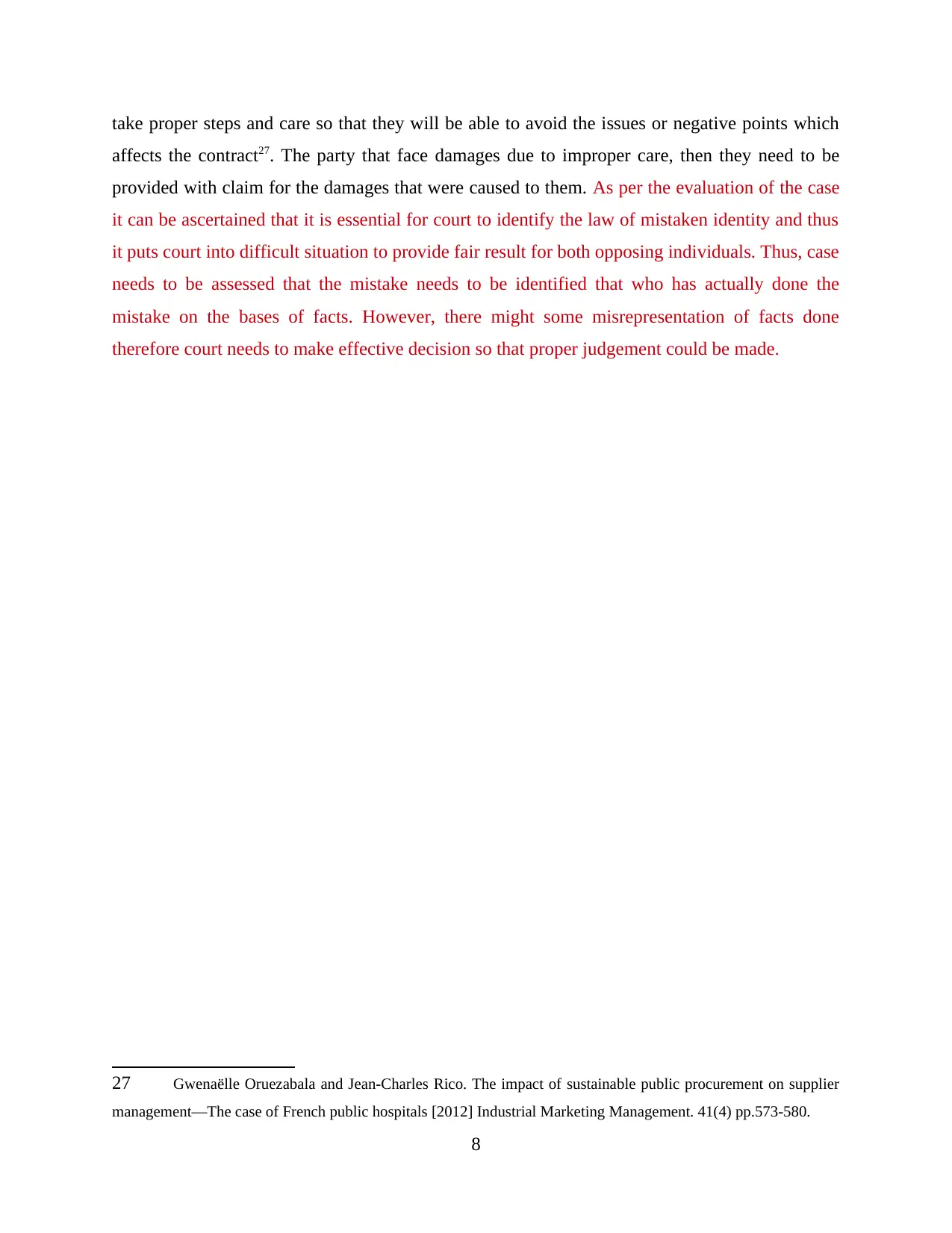
take proper steps and care so that they will be able to avoid the issues or negative points which
affects the contract27. The party that face damages due to improper care, then they need to be
provided with claim for the damages that were caused to them. As per the evaluation of the case
it can be ascertained that it is essential for court to identify the law of mistaken identity and thus
it puts court into difficult situation to provide fair result for both opposing individuals. Thus, case
needs to be assessed that the mistake needs to be identified that who has actually done the
mistake on the bases of facts. However, there might some misrepresentation of facts done
therefore court needs to make effective decision so that proper judgement could be made.
27 Gwenaëlle Oruezabala and Jean-Charles Rico. The impact of sustainable public procurement on supplier
management—The case of French public hospitals [2012] Industrial Marketing Management. 41(4) pp.573-580.
8
affects the contract27. The party that face damages due to improper care, then they need to be
provided with claim for the damages that were caused to them. As per the evaluation of the case
it can be ascertained that it is essential for court to identify the law of mistaken identity and thus
it puts court into difficult situation to provide fair result for both opposing individuals. Thus, case
needs to be assessed that the mistake needs to be identified that who has actually done the
mistake on the bases of facts. However, there might some misrepresentation of facts done
therefore court needs to make effective decision so that proper judgement could be made.
27 Gwenaëlle Oruezabala and Jean-Charles Rico. The impact of sustainable public procurement on supplier
management—The case of French public hospitals [2012] Industrial Marketing Management. 41(4) pp.573-580.
8
⊘ This is a preview!⊘
Do you want full access?
Subscribe today to unlock all pages.

Trusted by 1+ million students worldwide
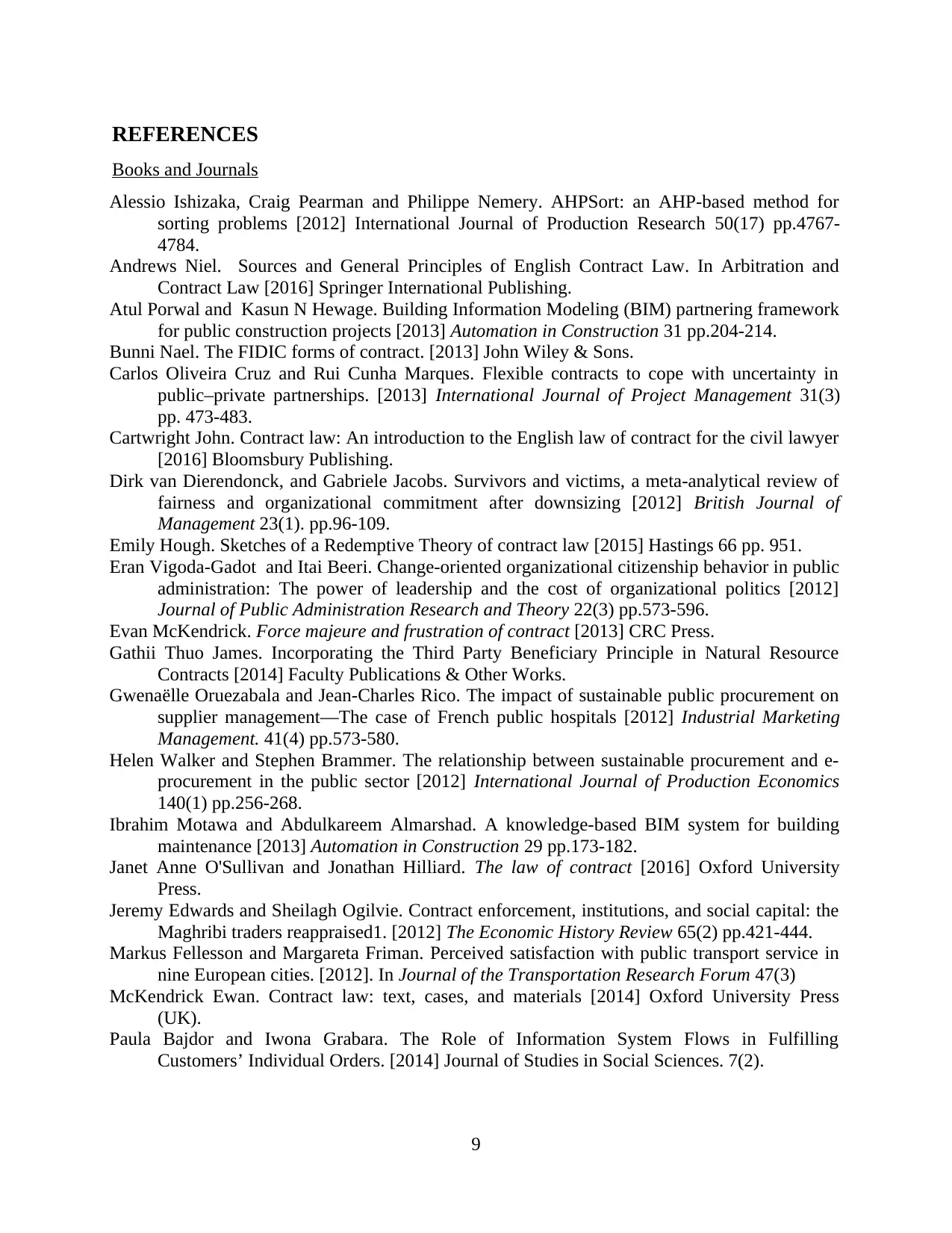
REFERENCES
Books and Journals
Alessio Ishizaka, Craig Pearman and Philippe Nemery. AHPSort: an AHP-based method for
sorting problems [2012] International Journal of Production Research 50(17) pp.4767-
4784.
Andrews Niel. Sources and General Principles of English Contract Law. In Arbitration and
Contract Law [2016] Springer International Publishing.
Atul Porwal and Kasun N Hewage. Building Information Modeling (BIM) partnering framework
for public construction projects [2013] Automation in Construction 31 pp.204-214.
Bunni Nael. The FIDIC forms of contract. [2013] John Wiley & Sons.
Carlos Oliveira Cruz and Rui Cunha Marques. Flexible contracts to cope with uncertainty in
public–private partnerships. [2013] International Journal of Project Management 31(3)
pp. 473-483.
Cartwright John. Contract law: An introduction to the English law of contract for the civil lawyer
[2016] Bloomsbury Publishing.
Dirk van Dierendonck, and Gabriele Jacobs. Survivors and victims, a meta‐analytical review of
fairness and organizational commitment after downsizing [2012] British Journal of
Management 23(1). pp.96-109.
Emily Hough. Sketches of a Redemptive Theory of contract law [2015] Hastings 66 pp. 951.
Eran Vigoda-Gadot and Itai Beeri. Change-oriented organizational citizenship behavior in public
administration: The power of leadership and the cost of organizational politics [2012]
Journal of Public Administration Research and Theory 22(3) pp.573-596.
Evan McKendrick. Force majeure and frustration of contract [2013] CRC Press.
Gathii Thuo James. Incorporating the Third Party Beneficiary Principle in Natural Resource
Contracts [2014] Faculty Publications & Other Works.
Gwenaëlle Oruezabala and Jean-Charles Rico. The impact of sustainable public procurement on
supplier management—The case of French public hospitals [2012] Industrial Marketing
Management. 41(4) pp.573-580.
Helen Walker and Stephen Brammer. The relationship between sustainable procurement and e-
procurement in the public sector [2012] International Journal of Production Economics
140(1) pp.256-268.
Ibrahim Motawa and Abdulkareem Almarshad. A knowledge-based BIM system for building
maintenance [2013] Automation in Construction 29 pp.173-182.
Janet Anne O'Sullivan and Jonathan Hilliard. The law of contract [2016] Oxford University
Press.
Jeremy Edwards and Sheilagh Ogilvie. Contract enforcement, institutions, and social capital: the
Maghribi traders reappraised1. [2012] The Economic History Review 65(2) pp.421-444.
Markus Fellesson and Margareta Friman. Perceived satisfaction with public transport service in
nine European cities. [2012]. In Journal of the Transportation Research Forum 47(3)
McKendrick Ewan. Contract law: text, cases, and materials [2014] Oxford University Press
(UK).
Paula Bajdor and Iwona Grabara. The Role of Information System Flows in Fulfilling
Customers’ Individual Orders. [2014] Journal of Studies in Social Sciences. 7(2).
9
Books and Journals
Alessio Ishizaka, Craig Pearman and Philippe Nemery. AHPSort: an AHP-based method for
sorting problems [2012] International Journal of Production Research 50(17) pp.4767-
4784.
Andrews Niel. Sources and General Principles of English Contract Law. In Arbitration and
Contract Law [2016] Springer International Publishing.
Atul Porwal and Kasun N Hewage. Building Information Modeling (BIM) partnering framework
for public construction projects [2013] Automation in Construction 31 pp.204-214.
Bunni Nael. The FIDIC forms of contract. [2013] John Wiley & Sons.
Carlos Oliveira Cruz and Rui Cunha Marques. Flexible contracts to cope with uncertainty in
public–private partnerships. [2013] International Journal of Project Management 31(3)
pp. 473-483.
Cartwright John. Contract law: An introduction to the English law of contract for the civil lawyer
[2016] Bloomsbury Publishing.
Dirk van Dierendonck, and Gabriele Jacobs. Survivors and victims, a meta‐analytical review of
fairness and organizational commitment after downsizing [2012] British Journal of
Management 23(1). pp.96-109.
Emily Hough. Sketches of a Redemptive Theory of contract law [2015] Hastings 66 pp. 951.
Eran Vigoda-Gadot and Itai Beeri. Change-oriented organizational citizenship behavior in public
administration: The power of leadership and the cost of organizational politics [2012]
Journal of Public Administration Research and Theory 22(3) pp.573-596.
Evan McKendrick. Force majeure and frustration of contract [2013] CRC Press.
Gathii Thuo James. Incorporating the Third Party Beneficiary Principle in Natural Resource
Contracts [2014] Faculty Publications & Other Works.
Gwenaëlle Oruezabala and Jean-Charles Rico. The impact of sustainable public procurement on
supplier management—The case of French public hospitals [2012] Industrial Marketing
Management. 41(4) pp.573-580.
Helen Walker and Stephen Brammer. The relationship between sustainable procurement and e-
procurement in the public sector [2012] International Journal of Production Economics
140(1) pp.256-268.
Ibrahim Motawa and Abdulkareem Almarshad. A knowledge-based BIM system for building
maintenance [2013] Automation in Construction 29 pp.173-182.
Janet Anne O'Sullivan and Jonathan Hilliard. The law of contract [2016] Oxford University
Press.
Jeremy Edwards and Sheilagh Ogilvie. Contract enforcement, institutions, and social capital: the
Maghribi traders reappraised1. [2012] The Economic History Review 65(2) pp.421-444.
Markus Fellesson and Margareta Friman. Perceived satisfaction with public transport service in
nine European cities. [2012]. In Journal of the Transportation Research Forum 47(3)
McKendrick Ewan. Contract law: text, cases, and materials [2014] Oxford University Press
(UK).
Paula Bajdor and Iwona Grabara. The Role of Information System Flows in Fulfilling
Customers’ Individual Orders. [2014] Journal of Studies in Social Sciences. 7(2).
9
Paraphrase This Document
Need a fresh take? Get an instant paraphrase of this document with our AI Paraphraser
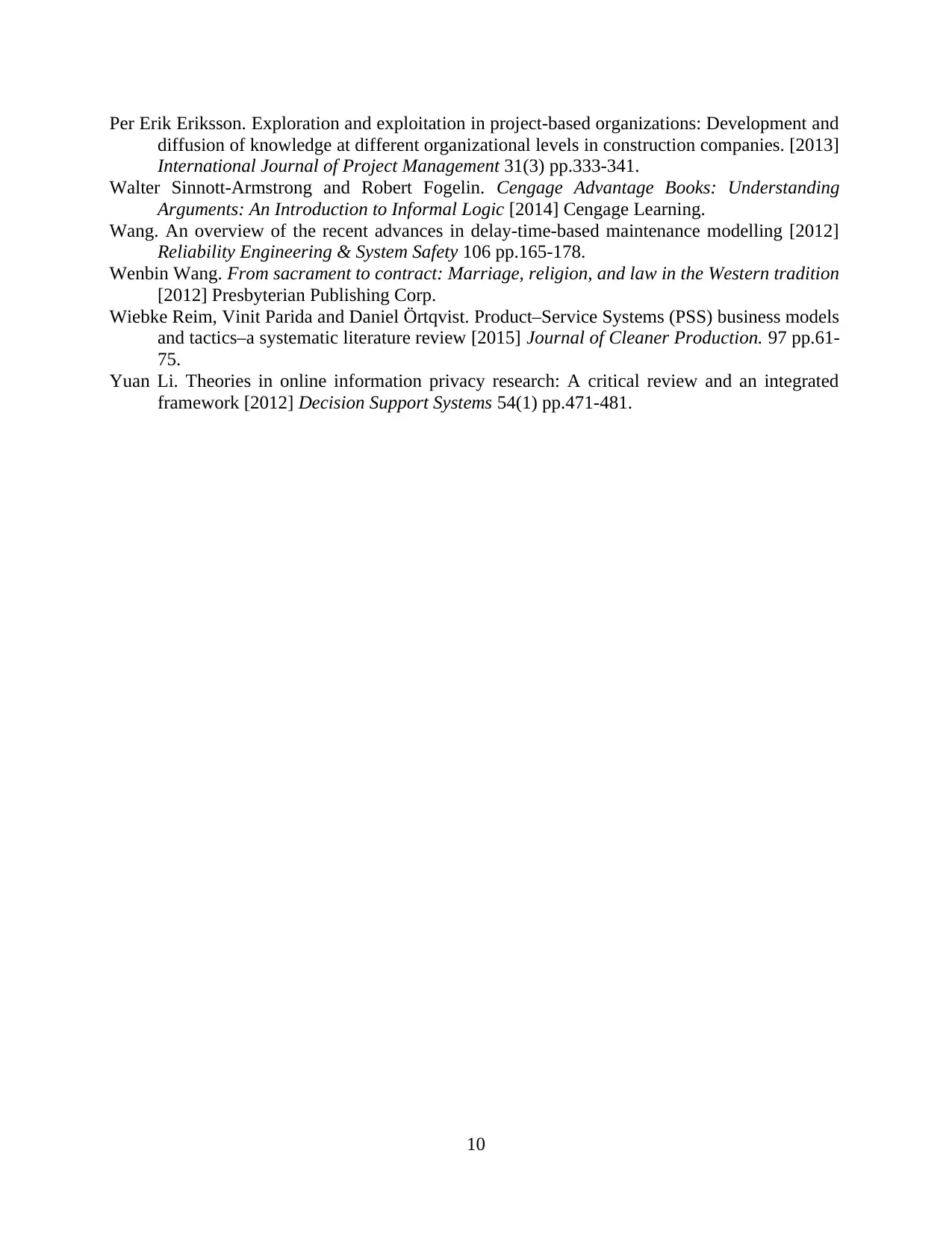
Per Erik Eriksson. Exploration and exploitation in project-based organizations: Development and
diffusion of knowledge at different organizational levels in construction companies. [2013]
International Journal of Project Management 31(3) pp.333-341.
Walter Sinnott-Armstrong and Robert Fogelin. Cengage Advantage Books: Understanding
Arguments: An Introduction to Informal Logic [2014] Cengage Learning.
Wang. An overview of the recent advances in delay-time-based maintenance modelling [2012]
Reliability Engineering & System Safety 106 pp.165-178.
Wenbin Wang. From sacrament to contract: Marriage, religion, and law in the Western tradition
[2012] Presbyterian Publishing Corp.
Wiebke Reim, Vinit Parida and Daniel Örtqvist. Product–Service Systems (PSS) business models
and tactics–a systematic literature review [2015] Journal of Cleaner Production. 97 pp.61-
75.
Yuan Li. Theories in online information privacy research: A critical review and an integrated
framework [2012] Decision Support Systems 54(1) pp.471-481.
10
diffusion of knowledge at different organizational levels in construction companies. [2013]
International Journal of Project Management 31(3) pp.333-341.
Walter Sinnott-Armstrong and Robert Fogelin. Cengage Advantage Books: Understanding
Arguments: An Introduction to Informal Logic [2014] Cengage Learning.
Wang. An overview of the recent advances in delay-time-based maintenance modelling [2012]
Reliability Engineering & System Safety 106 pp.165-178.
Wenbin Wang. From sacrament to contract: Marriage, religion, and law in the Western tradition
[2012] Presbyterian Publishing Corp.
Wiebke Reim, Vinit Parida and Daniel Örtqvist. Product–Service Systems (PSS) business models
and tactics–a systematic literature review [2015] Journal of Cleaner Production. 97 pp.61-
75.
Yuan Li. Theories in online information privacy research: A critical review and an integrated
framework [2012] Decision Support Systems 54(1) pp.471-481.
10
1 out of 11
Your All-in-One AI-Powered Toolkit for Academic Success.
+13062052269
info@desklib.com
Available 24*7 on WhatsApp / Email
![[object Object]](/_next/static/media/star-bottom.7253800d.svg)
Unlock your academic potential
Copyright © 2020–2026 A2Z Services. All Rights Reserved. Developed and managed by ZUCOL.

